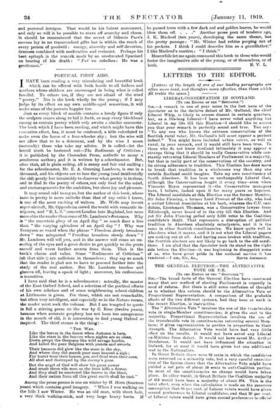LETTERS TO THE EDITOR.
[Letters of the length of one of our leading paragraphs are often more read, and therefore more effective, than those which fill treble the space.] --- LIBERAL-CONSERVATISM IN SCOTLAND.
(To TM EDITOR OP PRE BPEOPAPOR."1 Suss—A remark in one of your notes in the last issue of the Spectator as to the decisive defeat of Mr. Gotland, the chief Liberal Whip, is likely to arouse dissent in certain quarters, but, as a life-long Liberal—I have never voted anything but Liberal in my life till this Election—I should like to assure you that your remark is perfectly sound and true. You say, "To any one who knows the extreme conservatism of the Scottish rural voter, Mr. Gulland's fall must appear a portent Indeed." Yost might have included urban voters, as well as rural, in your remark, and it would still have been true. To those who do not know Scotland intimately it may appear a strange thing that it should be really Conservative while con- stantly returning Liberal Members of Parliament in a majority, but that is really part of the conservatism of the country, and its strong adherence to tradition. This Election has done more to break that tradition in a wholesome way than any one outside Scotland could imagine. Take my own constituency of South Aberdeen. It has been so unchangeably Liberal that, although the Conservatives fought it every time—even when Viscount Bryce represented it—the Comarvative managers have, I believe, looked upon it for many years as hopeless. The Liberal candidate at this Election was the former Member, Sir John Fleming, a former Lord Provost of the city, who had a united Liberal Association at his back, whereas the 0.11. can- didate, Lieutenant Thomson, was a Conservative lawyer from Edinburgh, never heard of in the city till this Election. And yet Sir John Fleming polled only 3,535 votes to the Coalition candidate's 10,605. That represents a disruption of political tradition in Aberdeen absolutely cataclysmic, and it is the same in other Scottish constituencies. We know quite well in Aberdeen what it means, and it Is not what the Liberal papers are reeking out at all. And having once broken with tradition, the Scottish electors are not likely to go back to the old condi- tions. I am glad that the Spectator took its stand en the right side before the Election—it was beginning to disappoint some of us, who have great pride in the national service it has


































 Previous page
Previous page